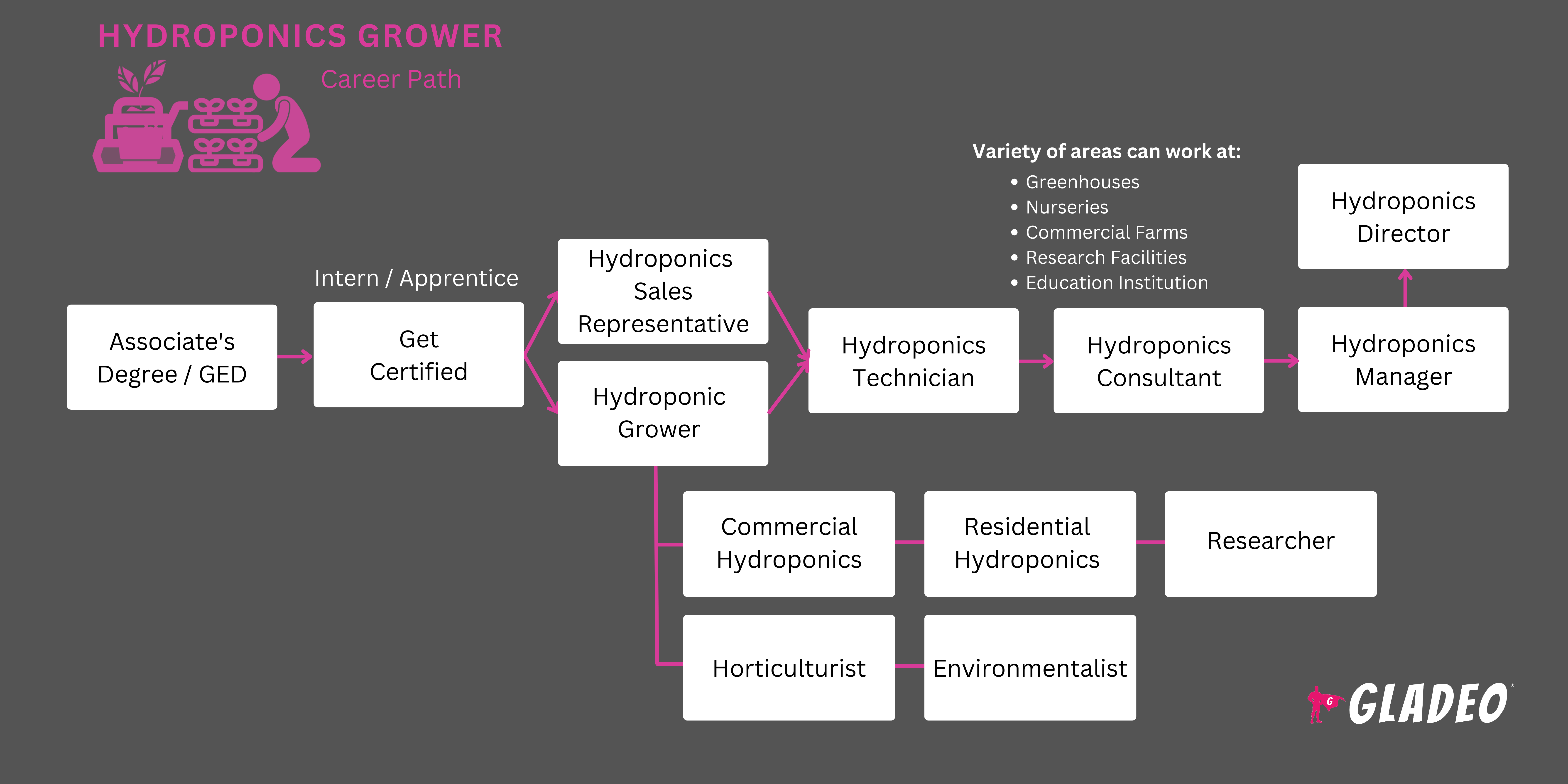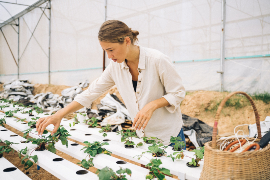Spotlights
Hydroponic Grower, Hydroponics Farm Manager, Hydroponics Technician, Hydroponics Researcher, Vertical Farming Specialist, Controlled Environment Agriculture Specialist, Hydroponics Consultant, Indoor Farming Manager, Hydroponic Crop Production Manager, Greenhouse Grower
As strange as it may seem, not all plants require soil to grow. Instead, they can get the nutrients they need through special nutrient-rich water that delivers essential elements directly to their roots!
To accomplish this requires the work of trained Hydroponic Growers who can set up and maintain soilless growing systems in carefully controlled environments. Many growers work for greenhouses, farms, or retailers growing herbs, fruits, and vegetables such as lettuce, tomatoes, cucumbers, and other leafy greens.
Hydroponic Growers monitor water quality, nutrient levels, and environmental conditions such as temperature and humidity to help plants grow healthy and strong. They perform regular checks on the growing system’s pumps, filters, and lighting to make sure everything is working correctly so they can achieve a successful harvest.
- Getting to spend time peacefully working with fruits, vegetables, and other plants
- Knowing your work provides resources for food, medical, or wellness products
- Helping the environment through efficient use of water and reduced use of land and chemicals
Working Schedule
- Hydroponic Growers may work full or part-time. Since indoor controlled systems use artificial light, growers may work night shifts at 24/7 operations such as commercial hydroponic farms.
Typical Duties
- Assemble soilless growing systems, including growing beds, reservoirs, and pumps
- Inspect system components on a regular basis to ensure they are operating within parameters
- Calibrate lighting, irrigation, and climate-control systems
- Ensure consistent, even exposure to light
- Make sure suitable temperatures and humidity levels are maintained at all times
- Determine proper nutrient solutions for optimal growing conditions. Review pH levels and electrical conductivity of solutions
- Monitor plants for signs of nutrient deficiencies, diseases, or exposure to pests
- Start seeds and clones, then move them to hydroponic systems when ready
- Trim and prune plants to boost growth
- Carefully harvest mature plants without disturbing other crops
- Keep detailed logs of all plant development and any problems
- Analyze data to assess ways to boost yields for future growing
- Use non-toxic or approved pesticide control measures
- Apply preventative treatments to avoid plant diseases
Additional Responsibilities
- Keep growing areas and tools clean to prevent disease and pests
- Determine inventory requirements. Find and purchase inventory from suppliers, wholesalers, and local growers
- Manage inventory. Keep track of supplies like nutrients, growing media, and spare parts
- Train and supervise extra staff, as directed
- Offload incoming inventory deliveries. Keep track of all stock to know when to reorder
- Keep up-to-date on technology and procedural updates
Soft Skills
- Accuracy
- Analytical
- Attention to detail
- Detail-oriented
- Independent
- Initiative
- Methodical
- Monitoring
- Organized
- Patience
- Reliable
- Scheduling
- Sound judgment and decision-making
- Time management
Technical Skills
- Ability to lift and carry up to 25 lbs.
- Ability to pass a background check, as needed
- Ability to stand, sit, stoop, and kneel for long periods
- Basic arithmetic and computer skills
- Basic research and measurement-taking skills
- Databases and analytics programs for plant health information
- Familiarity with Good Manufacturing Practices
- Knowledge of hydroponic operations, IT interfaces, and systems troubleshooting
- Minimum age of 21 (for some jobs)
- No (or manageable) allergies
- Tolerance of relatively high temperatures and humidity
- Valid driver’s license (for some jobs)
- Community gardens
- Controlled environmental habitats
- Crop production facilities
- Education and research sites
- Greenhouses
- Grocery and retail stores
- Indoor and vertical farms
- Nurseries/lawn and garden retailers
- Self-employment
- Urban buildings (for rooftop gardens)
Hydroponic Growers face various demands in their profession. They must consistently monitor systems, checking variables like water, nutrients, and pH to ensure optimal plant growth. Technical understanding of their setup is essential, coupled with the ability to solve problems quickly and an ongoing commitment to learning as technology and techniques progress.
They may work with plants used for food, medicines, and wellness purposes. Like any product that will be consumed by people, such plants must be handled in strict accordance with various regulations. This may require maintaining specific environmental conditions while wearing protective gear and closely following standard operating procedures.
Growers stay physically active, often standing or stooping for much of the day. They may need to lift and carry plants and system components around. If working inside greenhouses they often have to deal with hot temperatures and high humidity!
The hydroponics industry is experiencing significant growth these days! This has led to increased adoption of technology and automation because growers want to optimize their yields and resource usage. Smart systems that can monitor and adjust environmental variables in real time are helping with that. These systems, often integrated with AI, enable precise control over factors like nutrient levels, pH, and lighting.
Another trend is the surge in urban and vertical farming. Hydroponic methods provide a feasible solution for farming within city limits, even on rooftops. This reduces pollution caused by transporting produce long distances and ensures fresher produce for urban consumers.
Hydroponic Growers may have always had a “green thumb,” loving to work in their own gardens or tending to indoor houseplants. They may have enjoyed the relaxation that comes from working with plants. They are patient and meticulous, traits that could have come from any number of childhood experiences!
- Some Hydroponic Growers have a bachelor’s degree in horticulture, plant science/botany, crop science, or agriculture, but that is not always needed to get started
- Students considering college should look for programs offering a minor or area of specialization in hydroponics
- For those interested in the technical aspects of hydroponic systems, agricultural engineering or bioengineering may be suitable major options
- Many workers gain entry-level experience through workshops or community college classes about hydroponics and growing soilless plants indoors
- Applicants should ideally have some working knowledge of basic plumbing, HVAC and environmental control systems, plus a general aptitude with mechanical and electrical systems
- Students might want to focus on one or more of the standard systems for hydroponic production, such as wick systems, water culture, nutrient film technique, drip systems, aeroponic systems, Dutch buckets, and ebb and flow
- Learners can gain skills through ad hoc online courses from Udemy, HortCourses, Alison, Skillshare, Vertical Farming Academy, and other sites
- A college degree isn’t required for this career field, but online, vocational school, or associate’s degree-level courses may be helpful. A bachelor’s may be preferred by some employers
- Consider the cost of tuition, discounts, and local scholarship opportunities (in addition to federal aid)
- Check out Seed Your Future’s list of scholarships
- Think about your schedule and flexibility, when deciding whether to enroll in an on-campus, online, or hybrid program
- Consider taking classes from a private floral school in your area or online!
- Hydroponic Growers should have a basic understanding of botany. If your school features a gardening or agricultural program, sign up
- Nothing beats hands-on practice, but many hydroponics principles can be learned online or through reading magazines and books
- Check out articles, blogs, and videos by hydroponics YouTubers like Everest Fernandez and Jeb Gardener
- Consider taking ad hoc online courses from Udemy, HortCourses, Alison, Skillshare, Vertical Farming Academy, and other sites
- Try to learn about as many soilless plant types as you can, but also decide if there is a particular type of hydroponics you want to specialize in
- Learn about the different commercial and home-based systems and equipment involved
- Apply for part-time jobs or volunteer in exchange for some free training
- Draft up a working resume to keep track of your work and academic accomplishments
- Start your own hydroponics garden at home!

- Look for job postings on Indeed.com as well as local listings on Craigslist
- Research possible employers in your area, such as local greenhouses, grocery and retail stores, nurseries, controlled environmental habitats, vertical farms, etc.
- Try to find out if they have hydroponics operations and if so, who manages them. If you don’t see a job posting, touch base with them to see if they have any projected openings in the near future
- Visit local farmer's markets and get to know vendors. See if they know about anyone hiring hydroponics growers!
- Take hydroponics-related classes and get acquainted with your fellow students. Grow your network and let them know when you’re looking for work
- Talk to your school’s career center about help with resume writing, interview preparation, or job searching
- Reach out to people you’d like to list as personal references and ask them for permission to share their contact info
- If you don’t have a college degree, consider taking classes and earning a certificate, associate’s, or bachelor’s
- Learn all the “behind-the-scenes” processes of the place where you work. Let your supervisor know you are happy to start doing extra duties. Make yourself indispensable!
- Ask if there are particular specialized hydroponics skills or systems you could learn that could benefit the business. Let them know you are willing to do the training and ask if they can offer tuition assistance
- Show up to work on time and take good care of the plants under your care
- Closely monitor plants for signs of disease, pests, or malnourishment
- Work well with others and train new employees to a high standard. Remember that many of the plants you’re growing will be eaten or otherwise consumed
- Always practice good safety procedures and wear gloves or eye protection, as needed
- Stay up to date on trends and continue to learn about new systems, methods, and best practices
- Engage with professional hydroponics organizations like the Hydroponic Society of America. Attend meetings and events to learn and make connections
- Build strong relations with vendors such as wholesalers and suppliers
- When the time is right, consider applying to larger employers that may offer higher salaries or better promotion opportunities
Websites
- American Society for Horticultural Science
- American Society of Plant Biologists
- Aquaponics Association
- Epic Gardening
- Garden Culture Magazine
- GEEKGARDENER
- Hydroponic Society of America
- Reddit subreddits such as r/hydro and r/Hydroponics
- Science in Hydroponics
Books
- Aquaponics for Beginners: How to Build your own Aquaponic Garden that will Grow Organic Vegetables, by Nick Brooke
- DIY Hydroponic Gardens: How to Design and Build an Inexpensive System for Growing Plants in Water, by Tyler Baras
- Hydroponics and Greenhouse Gardening: 3-in-1 Gardening Book to Grow Vegetables, Herbs, and Fruit All-Year-Round, by Richard Bray
As Grandview Research notes, the global hydroponics market is expected to grow by 20.7% through 2028, due to the “increasing use of hydroponic systems for the indoor farming of vegetables.” So the demand for Hydroponic Growers should remain steady. But if you want to explore a few related career fields, check out some of the below options:
- Agricultural and Food Science Technician
- Agronomist
- Ecologist
- Environmental Scientist
- Grounds Maintenance Worker
- Horticulturist
- Landscaper
- Naturalist
- Pesticide Handler
- Plant Biologist
- Soil Scientist
- Vineyard Manager
Newsfeed

Featured Jobs

Online Courses and Tools







